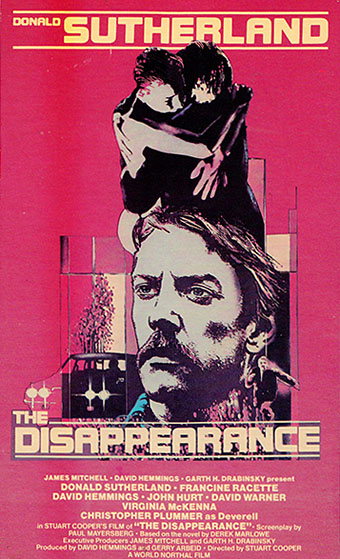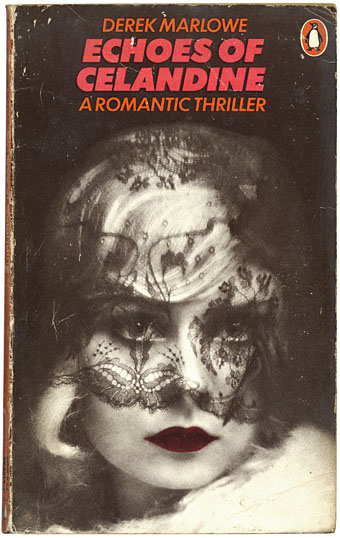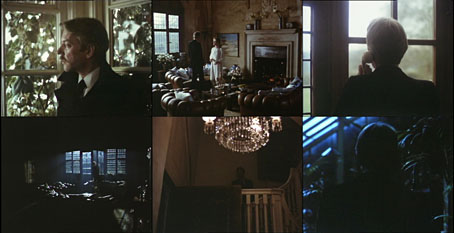
If you’re an obsessive cineaste there’s a good chance you maintain a mental list of the films you’d like to see, the films you’d like to see again, and the films you’d like to see reissued on DVD. The vagaries of distribution and ownership often conspire to make older films fall out of sight even when they’ve been produced and promoted by major studios, have had TV screenings and so on. This was famously the case with five of Alfred Hitchcock’s features—Vertigo and Rear Window among them—which managed to remain out of circulation for two decades; more notoriously there was Stanley Kubrick’s neurotic embargo on any screening of A Clockwork Orange in the UK which meant that my generation of Kubrick-watchers had to make do with a variety of pirate VHS recordings.

Penguin edition, 1973. Photo by Van Pariser.
DVD reissues have chipped away at my “must see again” list with the result that Stuart Cooper’s The Disappearance (1977) recently found itself at the top of the catalogue. This film has never been as inaccessible as some: it received at least two TV screenings in the UK, and was available on VHS cassette for a time. There was also a DVD release although by the time I started looking for it the only available copies were secondhand ones commanding high prices. A year or so ago I read Derek Marlowe’s Echoes of Celandine (1970), the novel on which the screenplay is based, and as a result became more eager than ever to see the film again. Having finally watched a very poor-quality transfer of a VHS copy on YouTube I now feel sated, even if the experience was unsatisfying.
The Disappearance is one of those odd productions that ought to have all the ingredients to make a very memorable film but which never works as well as you might hope. The screenplay was by Paul Mayersberg, written between his two films with Nicolas Roeg, The Man Who Fell to Earth (1976) and Eureka (1983); there’s a great cast: Donald Sutherland, David Warner, Peter Bowles, David Hemmings (who also produced), John Hurt, Virginia McKenna, Christopher Plummer; Kubrick’s cameraman of the 1970s, John Alcott, photographed the film shortly after winning an Oscar for his work on Barry Lyndon; the source material is very good: Marlowe’s novel is described as “a romantic thriller” but when the quality of the writing easily matches any literary novels of the period such a description makes it sound more generic and pot-boiling than it is.
Both novel and film concern a professional hitman, Jay Mallory, whose latest contract—which he at first rejects—coincides with the unexplained disappearance of his wife, Celandine. This is the disappearance of the film’s title, although film and book differ so much in setting and tone that the disappearance might also refer to the missing eighty percent of the novel. Mayersberg and Cooper move the framing locations from London to Montreal, while Mallory’s assassination mission to Scotland in the novel becomes a journey to Suffolk in the film. The script retains character names and roles, and the bare bones of the plot, but that’s all; the sardonic and witty first-person narrative is jettisoned in favour of chilly exteriors, glossy interiors and dialogue which doesn’t tell you very much at all about the characters. To be fair to writer and director, 20 minutes was chopped out of the running time, and since this is the only version I’ve seen to date you can’t expect it to fully represent was originally intended. Donald Sutherland’s portrayal of Mallory is as cold as the winter locations, and not very far removed from his frigid detective in Klute (1971). American cinema in the 1970s had more than its share of hired killers, all of whom tended to be stoic and taciturn. Sutherland’s Mallory fits the type, and if that seems like a betrayal of the novel I doubt the film would have been made at all otherwise.

After rewatching The Disappearance I can see now that the main flaw is that Mayersberg and Cooper stripped away the heart of Marlowe’s novel without adding much of their own to compensate for the loss. Mayersberg’s scripts for Roeg are filled with verbal detail and symbolism but there’s little of that here. It might have been better if the whole production had been made even more spare and minimal, like Melville’s Le Samouraï (1967). Some of the opening scenes, with their combination of icy Canadian landscapes and Modernist architecture (including one startling shot of the Montreal Biosphère) resemble the early films of David Cronenberg, but any sense of menace is dispelled by an unsympathetic score that would have been more suited to an episode of Kojak. (To be fair again, this seems to have been another unwarranted imposition.) There’s also one complete non sequitur when Mallory is nearly ambushed on a lonely country road. This scene is not only unexplained (although the missing 20 minutes may have clarified matters), it’s also completely absurd to have what appears to be a middle-class family attempting to rob someone at gunpoint in the English countryside.
The copy of The Disappearance at YouTube is pretty poor, being cropped to 4:3, and with dreadful sound and a very dark picture. Anyone curious enough to watch it is advised to download it first then use VLC to boost the sound and visuals. Having wondered for years when I might see this film again it turns out that it was reissued on Blu-ray last year, a limited release from Screen Archives Entertainment which looks as superb as you’d expect with John Alcott behind the camera, and which also presents the director’s original cut. Despite the reservations expressed above I’m tempted to get this to discover what’s in those missing 20 minutes. In the meantime there are more Derek Marlowe novels to chase down. Paul Gallagher has an appraisal of Marlowe’s career at Dangerous Minds.

Thanks for the memory jog re Derek Marlowe. I have a copy of the Penguin edition of “Echoes of Celandine” , and possibly a few more of his novels – “A Single Summer With LB” being one that springs to mind.
I was surprised at how good the book was, with thrillers it’s often the film that’s better than the book. A shame I didn’t pick up on him sooner, I expect I’ve overlooked many of his novels in the charity shops.
I’ll get round to reading again soon, as I can’t remember a thing about it.
The Single Summer novel is about Lord Byron, Mary & Percy Shelley etc. at Lake Geneva and is quite good as well as far I can recall of the book.
http://www.shortlist.com/entertainment/books/8-adaptations-that-massively-deviate-from-the-books
A quick look on Amazon and a copy for £10.99
http://www.amazon.co.uk/gp/offer-listing/B00009PBYE/ref=dp_olp_collectible?ie=UTF8&condition=collectible
Thanks, Kevin, that wasn’t the case a while ago. The DVD is still the shorter version, however, so for now the Blu-ray is optimum. The problem there is that it’s encoded to Region 1. They might sell more copies if they’d made it region-free the way William Friedkin did with the Blu-ray release of Sorcerer, another film that was out of circulation for a long time.
Judging by the running times listed on the Blu-ray release, the director’s cut only runs 10 minutes longer than the cut version, not 20. Some of the differences are due not just to cuts but to rearrangement of scenes.
A while ago I bought this movie on a German DVD and was surprised to find that it was only 88 minutes long and a different edit to the 99-minute version that I recorded off BBC1 in 1984 (which I assume is the director’s cut). The TV version starts with a scene of Mallory kissing Celandine while she’s playing the piano and then cuts to the “shy” on the boat. In the DVD version the latter scene is cut into a later sequence where Mallory is talking to Burbank.
According to Wikipedia Eric Boyd-Perkins originally edited the film; but the version released in Canadian cinemas in 1983 had been re-cut by “film doctor” Fima Noveck.
I was a bit disappointed to see that the DVD was in a 4:3 ratio like the TV screening, and the picture quality was not ideal. I’m tempted to seek out the Blu-ray as I really like the mood and style of this film.
Thanks, Robin, The YT version runs 81 minutes but that may be down to tape speeds, frame-rates and the like. There doesn’t appear to be anything missing—although how would I know? Ha! What’s clear is that screen-grabs of the BR version show many shots that aren’t in the YT version at all.
Pretty disgraceful that the DVD is cropped but then that was still common a few years ago. My original copy of Boogie Nights was like that, same with the shoddy 1999 release of Sorcerer.
There’s a nice lengthy review of the BR edition here:
http://offscreen.com/view/disappearance-stuart-cooper
Re: the review mentioned above, from this it’s evident that the 81-minute version was the Fima Noveck re-edit which Stuart Cooper disowns. So anyone watching the YT copy shouldn’t judge the film too harshly on that alone (me included).